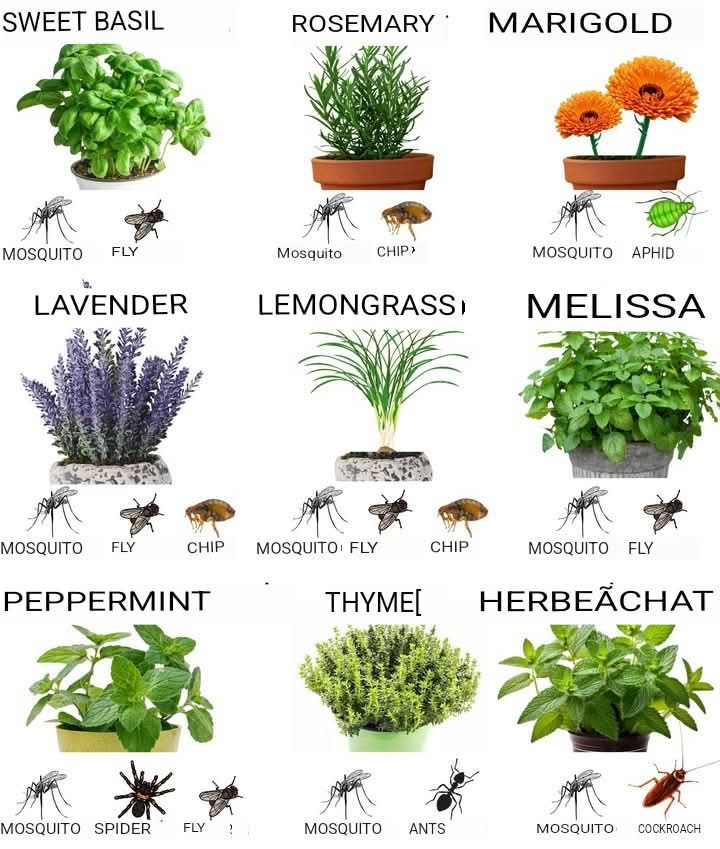Gardening is a rewarding activity, but dealing with harmful insects can be frustrating. Instead of relying on chemical insecticides, which can harm the environment and beneficial insects, many gardeners turn to natural insect repellents: plants that naturally repel harmful pests. Integrating these repellent plants into your garden can help protect your plants, reduce pest problems, and foster a healthy, diverse garden ecosystem. Here’s a guide to 11 plants that can help naturally defend your garden from unwanted insect invaders.
1. Basil 🌿
Basil is a fragrant herb that not only enhances your cooking but also acts as a natural repellent for mosquitoes and flies. The strong scent of basil is particularly effective in keeping these pests at bay. You can plant basil near seating areas or near other vegetables to create a mosquito-free zone. Basil is also a great companion plant for tomatoes, as it helps repel harmful insects that target tomatoes, such as aphids and hornworms.
2. Lavender 🌸
Lavender is known for its calming fragrance, but it’s also a powerful insect repellent. It keeps moths, fleas, flies, and midges away. Planting lavender around your garden or near entryways will help keep flying pests out, and its pleasant aroma will add beauty to your garden. Lavender’s resilience and low maintenance also make it a fantastic addition to any garden.
3. Citronella 🍋
Citronella is best known for its ability to repel mosquitoes. This plant is commonly used in mosquito-repelling candles, but you can also plant it in your garden to ward off these pesky insects. Citronella has a strong lemon-like scent that is unpleasant for mosquitoes and can be planted in pots or directly in the ground near patios, gardens, or any outdoor space you wish to enjoy without the threat of mosquito bites.
4. Calendula 🌼
Calendula, also known as marigold, is a colorful addition to the garden that repels a variety of pests. It’s particularly effective at keeping mosquitoes, aphids, and rabbits away. The bright yellow or orange flowers not only look cheerful but also act as a natural pest deterrent. Calendula can be planted alongside vegetables to protect them from insect damage while adding beauty and color to your garden.
5. Mint 🌱
Mint is a vigorous-growing herb that repels several types of insects, including mosquitoes, ants, and even mice. Mint’s strong scent overwhelms the sensory receptors of many pests, causing them to stay away. Plant mint in containers to prevent it from taking over your garden, or grow it near areas where you want to keep pests away. Be mindful to trim it regularly as mint can spread quickly.
6. Catnip 🐱
Catnip is another plant that serves as an excellent natural insect repellent. It repels mosquitoes, ants, and cockroaches. Interestingly, while cats are drawn to catnip, insects like mosquitoes are not. This plant is particularly effective when planted near garden entrances or areas where you spend time outdoors. Catnip is easy to grow and thrives in full sun with well-drained soil.
7. Chrysanthemum 🌼
Chrysanthemums, with their beautiful, showy flowers, are not just a stunning addition to your garden—they are also excellent pest repellents. They naturally repel cockroaches, ants, Japanese beetles, ticks, and silverfish. The flowers contain a compound called pyrethrum, which is toxic to many insects, making chrysanthemums an effective and natural alternative to chemical pesticides. These flowers are best placed around garden borders or areas where pest problems are most common.
8. Garlic 🧄
Garlic is a well-known repellent for a variety of insects, including aphids, midges, and moths. Its strong scent deters many garden pests. Plant garlic in your garden or near the edges of your vegetable beds to protect your crops from aphids and other pests that can damage your plants. Plus, garlic is easy to grow and can be harvested for culinary use as well.
9. Rosemary 🌿
Rosemary is a fragrant herb that works wonders as a natural pest deterrent. It helps repel mosquitoes, carrot flies, and moths. Rosemary’s strong scent is unappealing to many insects, and it can be planted in your garden or around your patio to keep pests away. As a bonus, rosemary can also be used in cooking and is great for attracting pollinators like bees.
10. Petunias 🌺
Petunias are not only beautiful and colorful flowers but also serve as an excellent natural pest control. They repel aphids, tomato caterpillars, and asparagus beetles, making them an ideal plant for vegetable gardens. Plant petunias near your vegetable beds to protect your crops from harmful pests. Additionally, petunias attract beneficial insects like bees and butterflies, which help pollinate your garden.
11. Citronella (Cymbopogon nardus) 🍃
Citronella (not to be confused with the common citronella plant) is another variety of citronella grass known for its ability to repel mosquitoes. This plant is widely used in natural insect repellents because of its strong lemon-like scent, which mosquitoes find unpleasant. Plant citronella near areas where you relax or dine outdoors to enjoy the outdoors without the annoyance of mosquitoes.
Benefits of Using Natural Insect Repellents
Eco-Friendly: Natural insect repellents are safe for the environment and do not harm beneficial insects, such as bees, butterflies, and ladybugs. Unlike chemical pesticides, they won’t contaminate your soil or water.
Cost-Effective: Many of these plants are easy to grow, and once established, they require little care. Planting them in your garden can save money on commercial insecticides.
Improved Biodiversity: By using natural repellents, you encourage a diverse and balanced ecosystem in your garden. Beneficial insects, such as pollinators, thrive, which can improve the overall health and productivity of your plants.
Non-Toxic: These plants are non-toxic to humans and pets, unlike many commercial insecticides that can be harmful to your family and pets.
How to Integrate These Plants into Your Garde
Companion Planting: Plant repellent plants alongside your vegetables, herbs, and flowers to naturally protect them from pests. For example, plant basil next to tomatoes to ward off mosquitoes and aphids.
Borders and Edges: Grow plants like lavender, rosemary, or chrysanthemums along the edges of your garden to create a natural pest barrier.
Containers and Pots: If you’re short on space, plant repellent plants in containers and place them near seating areas, patios, or doorways to keep pests at bay.
Succession Planting: Rotate your insect-repellent plants throughout the growing season to maintain effective pest control.
Final Thoughts
Incorporating insect-repellent plants into your garden is a natural, eco-friendly way to protect your crops from harmful pests. These plants not only help keep insects at bay, but they also add beauty, fragrance, and variety to your garden. Whether you are growing vegetables, herbs, or flowers, these 11 plants can provide a natural, sustainable solution to pest control. By reducing your reliance on chemical pesticides, you can create a healthier garden and contribute to a more biodiverse environment.
More Articles You Might Like
-
Texas Toast Sloppy Joes: The Crunchy, Cheesy Upgrade You Didn’t Know You Needed
There’s something timeless about sloppy joes. For generations, this saucy, savory, and slightly sweet ground beef sandwich has been a go-to comfort food in American kitchens. It’s quick, filling, and family-friendly—perfect for busy weeknights. But what if we told you there’s a way to take this classic dish up a notch? Enter the Texas Toast…
-
Classic Pig Pickin’ Cake
When it comes to Southern desserts, few sweets shine as brightly as the Classic Pig Pickin’ Cake. This nostalgic cake, sometimes called a “Mandarin Orange Cake,” has roots deep in Southern tradition. It gets its playful name from its frequent appearance at pig pickin’s—Southern-style barbecue gatherings where communities come together to enjoy slow-cooked pork, sides,…
-
Lemon Garlic Butter Chicken with Creamy Parmesan Pasta
There’s something irresistible about the combination of tender, golden-browned chicken paired with a creamy pasta coated in Parmesan cheese. Add the brightness of lemon, the depth of garlic, and the richness of butter, and you have a recipe that feels indulgent yet approachable enough for a weeknight dinner. Lemon Garlic Butter Chicken with Creamy Parmesan…



